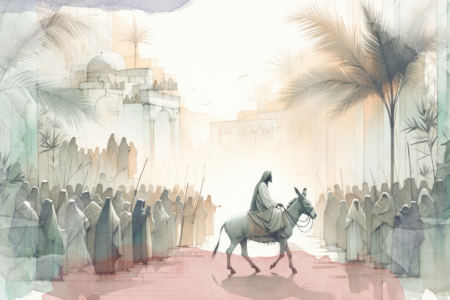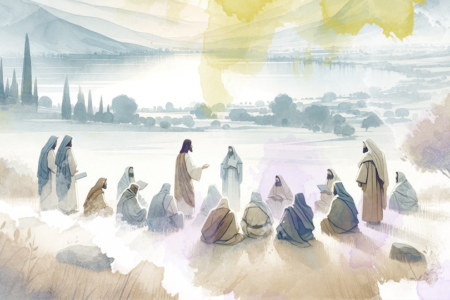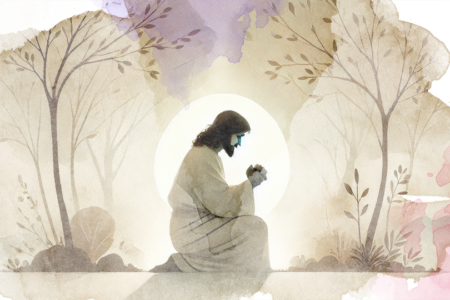“I Was Born A Jew And Will Die A Jew”
When one speaks to Jewish people about Jesus as the Messiah (in Hebrew Yeshua Ha-miashiach) he may often hear the remark: “I was born a Jew and will die a Jew.”
At first this sounds pretty reasonable, but when you analyze it closely, you realize that it does not stand up to sound reasoning.
To begin with, if a Jew believes that Yeshua is the Messiah of Israel, does it really follow that he must stop being a Jew?
On the contrary, experience tells us that such a person is more likely to dome a better Jew. He may not conform exactly to the popular idea of a Jew or to the rabbinical definition of one. However if he was born a Jew, his Jewishness will become more in line with the teachings of Israel’s great prophets and what God’s idea of a Jew is.
It should be remembered that Yeshua Himself was a Jew, the best and greatest that ever lived; a son of Abraham, Isaac and Jacob, of the tribe of Judah and of the royal house of David (see Matthew 1:1-17 and Luke 3:23-38). His life and His teachings personified all that is holy and eternal in the Torah. He was blameless and pleasing to God. Only some of the Jewish leaders of his day found fault with Him, because He always did the will of His heavenly Father rather than comply with petty rules and hair-splitting regulations.
Therefore, if a Jew believes in Jesus, he does not abandon his Jewishness but is more likely to become the kind of Jew God intended him to be.
In our times the vast majority of the Jewish people are Jews in name only. Their Jewishness is frequently merely an accident of birth and not a matter of personal choice or conviction. How can such “a Jew” through faith in Jesus of the New Testament, lose his Jewishness? He can only become a Jew who is more deeply aware of and grateful for his noble Jewish heritage.
I can speak from my own personal experience. About fifty years ago when this writer became a believer in Jesus, he also became more fully aware and appreciative of his own Jewishness.
Speaking about what it means to be a Jew, the famous Jew, Saul of Tarsus, better known as the apostle Paul, once said:
“Who are Israelites; to whom pertaineth the adoption, and the glory, and the covenants, and the giving of the law, and the service of God, and the promises; Whose are the fathers, and of whom as concerning the flesh Christ came, who is over all, God blessed for ever. Amen.” Romans 9:4-5
Obviously this great apostle of Jesus profoundly appreciated the Jewish People and was grateful for his own Jewishness.
And now let us consider this statement: “I was born a Jew and will die a Jew,” from another point of view.
Suppose that “Abraham Avinu”—Our Father Abraham,” when he was called by Jehovah to forsake the gods of his pagan ancestors, instead of obeying God, had said:
“Jehovah, how can you expect me to obey you, an unknown God, and go to an unknown land. After all my father Terah and all his ancestors, from way back, were idol worshippers. How can you expect me to become disloyal to the religion of my father and of all my ancestors?
Was born an idol worshipper and will die an idol worshipper!”
Would he not have used the same logic as those who say, “I was born Jew and I will die a Jew.”?!
However, thank God Abraham did not think that way, but instead chose to believe God and to obey Him. This is why Abraham is known to this day as “the friend of God” and “the father of all faithful.”
What a poor, dark world ours would have been if Abraham had chosen no to obey God.
If Abraham had disobeyed God and “had not changed his religion, there would have been no Moses, no Torah, no David, no Temple, no Prophet; no Jesus, no Apostles, no Jews and no Christians, just one dark, cruel world without hope and without the Light of God to illumine and to challenge the conscience of all men!
It is interesting to note that in the Bible, God does not command us to follow in the ways of our fathers if those ways lead us away from Him, but we are admonished repeatedly to turn away from the ways of our fathers when they are wrong. He even threatens us with severe judgment if we should do this.
“Thus, saith the Lord, Stand ye in the ways and see, and ask for the old paths, where is the good way, and walk therein, and ye shall find rest for your souls. . . .” (Jeremiah 6:16)
“. . . Walk ye not in the statutes of your fathers, neither observe their judgments, nor defile yourselves with their idols: I am the Lord your God; walk in my statutes, and keep my judgments, and do them,” (Ezekiel 20:18-19)
Not everything which our fathers did or thought was necessarily right. From the perspective of history, we can clearly see that we have frequently disobeyed Moses and the prophets, to our own great hurt, and that the rejection of Yeshua Ha-mashiach was a tragic mistake. Our greatest tragedy is that in rejecting Jesus we have cut ourselves off from the very source of light which God sent for all of mankind. It was about this Messiah that the prophet Isaiah prophesied:
“The people that walked in darkness have seen a great light: they that dwell in the land of the shadow of death, upon them hath the light shined.” (Isaiah 9:2)
“For unto us a child is born, unto us a son is given: and the government shall be upon his shoulder: and his name shall be called Wonderful, Counselor, The mighty God, The everlasting Father, The Prince of Peace.” Isaiah 9:6.
For nearly half a century this writer, a son of Abraham, Isaac and Jacob, has sought to follow Yeshua, the Prince of Peace and the Light of the world. He brought me forgiveness of sins, salvation and a new life. Now I would like to beseech all my fellow Jews, for the sake of their own salvation, and for the sake of the great destiny which God has in store for our people, to examine carefully the claims of Yeshua as the Messiah of Israel and the Saviour of all mankind. We shall only become that which God has intended us to be, a light and a blessing to all nations, when we shall believe in Him.
It is high time to wake up from the age old slumber of indifference and prejudice which has blinded us to the greatest of Israel’s sons—Jesus of Nazareth. Lest us draw near to God, not only with our “lips and mouth” but with our hearts. Then the Lord will receive us again as His people. Instead of being “Lo-Ammi and Lo-Ruhama,” we shall again become “Amml, and Ruhama,” “My people” and “the people upon whom God has compassion.(Hosea 1:8; 2:1).







